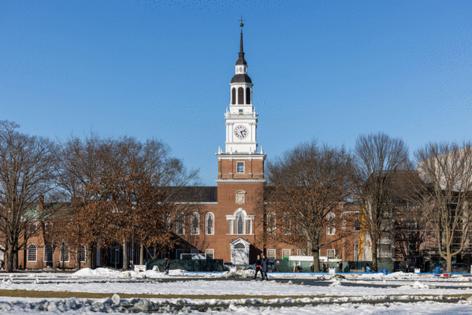White House floats new rules for colleges to get funding edge
Published in Political News
WASHINGTON — The Trump administration sent letters to a group of top-tier universities this week laying out a proposed compact that would cap international students, ban the use of race or sex in hiring, and require standardized testing as part of the admissions process in exchange for preferential access to federal funding.
The effort — labeled the “Compact for Academic Excellence in Higher Education” — says universities that agree to the terms will enjoy benefits including access to federal student loans, grants and contracts as well as research funding, approval of visas for foreign scholars and preferential treatment under the tax code.
The proposal is the latest effort by President Donald Trump to reshape and reorient higher education toward his policy and ideological priorities. Earlier this week, the president suggested Harvard University — a top target of his effort — was close to finalizing a $500 million settlement with the administration that would see the school fund trade programs.
The memo Wednesday outlining the new administration demands was sent to Vanderbilt University, Dartmouth College, the University of Pennsylvania, the University of Southern California, Massachusetts Institute of Technology, the University of Texas, the University of Arizona, Brown University and the University of Virginia, according to a White House official.
The universities were chosen because their leadership had indicated in some way they could possibly assist in the mission and the administration is looking for feedback on the proposal, the official said.
The White House is seeking pledges from universities that include:
—Disallowing consideration of sex, ethnicity, race, nationality, political views, sexual orientation, gender identity, religious associations in admission or financial aid decisions.
—Requiring undergraduate applicants to take a standardized test like the SAT or ACT.
—Adopting policies protecting academic freedom and abolishing “institutional units that purposefully punish, belittle, and even spark violence against conservative ideas.”
—Requirements against political demonstrations that disrupt study locations or harass individual students or groups.
—Hiring that does not consider sex, ethnicity, race, national origin, disability, or religion.
—Requiring all university employees to abstain in their official capacity from actions or speech related to politics.
—Fighting grade inflation or deflation for non-academic reasons.
—Maintaining “single-sex spaces” in bathrooms and locker rooms.
—Free tuition for students pursuing hard science programs at universities with an endowment exceeding $2 million per undergraduate student.
—Limiting undergraduate populations to have no more than 15% of students on foreign visas, with no more than 5% of students from any one country.
—Disclosure of all foreign funding.
The compact also says that adherence to the principles will be subject to review by the Department of Justice, and that violations would result in a loss of access to federal benefits for no less than two years. The document, which was obtained by Bloomberg News and first reported by The Wall Street Journal, also says that universities resistant to the demands “are free to develop models and values other than those below, if the institution elects to forego federal benefits.”
It’s not clear to what extent the administration could implement a preferential system without running afoul of constitutional free speech protections. Universities put at a disadvantage in funding competitions are likely to mount legal challenges over how the administration is awarding grants.
Still, the compact will ramp up pressure on universities eager to avoid the fate of some top-tier institutions targeted by the White House, which has argued that higher education institutions aren’t doing enough to promote academic freedom and ideological diversity on campuses.
Already, the University of Pennsylvania agreed to alter policies related to transgender athletes while Columbia University agreed to pay more than $200 million to settle complaints around discriminatory hiring and antisemitism. Brown University said it would use $50 million over the next decade to fund local workforce development programs.
©2025 Bloomberg L.P. Visit bloomberg.com. Distributed by Tribune Content Agency, LLC.
























































Comments